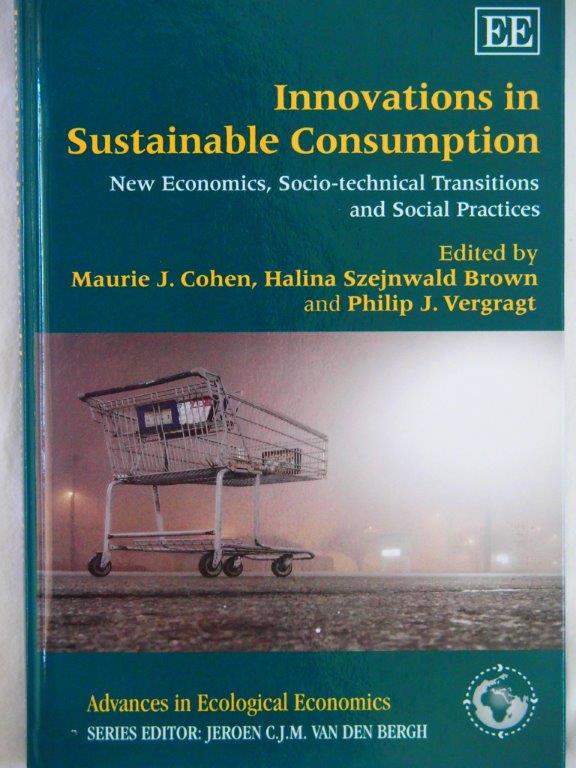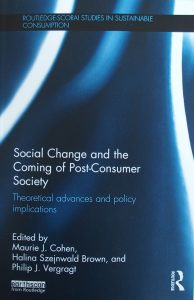I have been researching issues related to sustainable consumption for the past decade. I view the contemporary consumer society in the US and other wealthy countries of the global north as a construct; a complex system comprising technology, culture, infrastructure, social practices and norms, institutions, political ideologies, and market forces. As such, consumer society is very stable and resilient. My work centres on advancing the understanding of how consumer society has evolved and functions, and on identifying leverage points for fostering a transition beyond consumption-based economy and culture.
My interest in this area has evolved from my previous research on corporations, environmental policy and socio-technical transitions, which let me to two key conclusions: First, that environmental policy and corporate good will, while producing radical reductions since the 1970s in the levels of air, water and soil pollution, do not address the root cause of the unsustainable pressures on the earth’s life supporting systems: the ever-increasing demand for materials and energy. Second, that by itself, technologic change, in the form of efficiency gains, new materials and processes, and renewable energy sources, will not produce the necessary reductions (in the US, these being estimated at between 70 and 80%) in the emissions of climate-altering gasses; and that the material- and energy-intensive consumption also must decrease.
These interests led to an extremely fruitful collaborative relationship with Maurie Cohen and Philip Vergragt. In 2008 Maurie, Philip, John Stutz and I established the Sustainable Consumption Research and Action Initiative, SCORAI, an international network of researchers and policy practitioners working at the interface of material consumption, human well-being, and technological and cultural change. At the time, it was a modest initiative intended to bring together scholars and practitioners who recognized, as we did, that technology-based approaches (energy efficiency and transition to non-fossil fuel energy sources) will all by itself not solve the problem of global warming and climate change. It is necessary but not sufficient. We also need to reduce the ever-growing demand for energy that is largely driven by consumption. In 2008, we did not fully understand how that system of growing demand functions and what its component and roots were. But we knew this: this was an intellectual problem that required interdisciplinary collaboration and debate; and that scholars who did work on this problem were most likely isolated and could not see the entire picture as long as they examined it only from their own disciplinary perspective.
Since 2008, SCORAI-Global has become a highly visible network of people around the world, with about 1,500 subscribers. It is not a formal organization; it is a knowledge network. The network serves as a virtual salon for its members to discuss topics of interest, exchange information, and learn. Since the founding of SCORAI in 2008, Maury, Philip and I convened several international conferences and workshops; co-edited in 2013 a book entitled Innovations in Sustainable Consumption: New Economics, Socio-technical Transitions, and Social Practices; and in 2017 Social Change and the coming of Post-Consumer Society: Theoretical Advances and Policy Implications; We have also served as co-editors of a book series on sustainable consumption published by Routledge.


In 2017-2018 I served as a member of an Advisory Panel on Sustainable Consumption to the Materials Management Group (MMG, formerly named Waste Management Group) at the Oregon Department of Environmental Quality. The MMG is unique among analogous units within state environmental agencies in that it counts greenhouse gas emissions from the perspective of consumption patterns in Oregon (Consumption-Based Emission Inventory, CBEI) rather than using the traditional approach of counting the emissions from direct use of energy in the state. In the course of this project, I became increasingly interested in how the MMG team reframed their primary mission from the original Waste Management to Materials Management and associated consumption. This interest turned into a research project and a 2019 publication in Climate Policy.
My newest book project, coedited with Lewis Akenji, Philip J. Vergragt, Thomas S.J. Smith and Laura Maria Wallnöfer, is Vocabulary for Sustainable Consumption and Lifestyles: A Language for Our Common Future, published by Routledge in 2026. Open access is available.
This book seeks to create a shared language for spearheading a broad-based conversation about the future of consumer society in a world increasingly threatened by interlinked ecological and social tensions. Its bedrock premise is that we need to transition away from mass consumption as the organizing principle of societal life; to a society in which the well-being and dignity of people are achieved with a much smaller impact on life supporting earth systems. This book is especially tailored for those researchers, teachers, policymakers, activists, businesspeople, professional communicators and, crucially, members of the general public who recognize that the current trajectory for addressing the ecological crises is inadequate. This trajectory is largely based on technological solutions and economic quick fixes to what is essentially a social problem.

Sustainability transformation requires a compelling language for a shared understanding of (un)sustainable consumption and lifestyles. Despite its growing use in research and policy circles, the meaning of the term sustainable consumption remains quite undefined. Some associate it with daily household decisions such as minimal shopping, leisure flying and taking cruises, and green and ethical shopping. For social activists, sustainable consumption may suggest changing personal and community value systems, norms, social practices, personal priorities, diet or adopting a minimalist way of life. From a policy perspective, sustainable consumption may signify a personal carbon budget, shorter workweek, limits on advertising, more efficient buildings and mobility infrastructure; while the political economy perspective points toward a diminished role of the financial sector, degrowth, a steady state economy, taxation reform and reigning in corporate power.
The book is an unprecedented transdisciplinary collaboration. With contributions from over 130 of the world’s leading researchers on sustainable consumption, it contains 87 accessibly written entries across five main thematic fields: 1) Daily Household Decisions and Lifestyles; 2) Concepts, Frameworks and Applied Theories; 3) Political Economy of Consumption; 4) Social Activism and Value Shifts; and 5) Governance, Policy and Choice Architecture. Entries in the book include varied topics such as Steady State Economy, Circular Economy & Society, Work-Life Balance, Social Tipping Points, Hedonic Treadmill, Buen Vivir, 1.5-degree lifestyle, Quiet Sustainability, Universal Basic Services, Income vs. Happiness, Climate Justice and much more.
Relevant Publications
- Halina Szejnwald Brown. 2020. The US economy is reliant on consumer spending – can it survive a pandemic? The Conversation, August 13, 2020
- Halina Szejnwald Brown. 2020. Consumer Society, its Dangers and its Future. Czas Kultury (Culture Times), April 22, 2020. (This is an invited opening essay for a special issue of the Polish monthly Kultura (similar to Atlantic Monthly, with an academic bent). It is published in Polish. The topic of the special issue is economic growth and degrowth, and my contribution is to link growth with consumption, with a personal touch.)
- Halina Szejnwald Brown & Maurie J. Cohen 2019, “Climate-governance enterpreneurship, higher-order learning, and sustainable consumption: the case of state of Oregon, U.S.” Climate Policy (an on-line journal)
- Brown, H.S. and Vergragt, P.J. 2016. From Consumerism to Wellbeing: Toward a Cultural Transition. Journal of Cleaner Production.
- Brown, H.S. 2014. Editorial: The next generation of research on sustainable consumption. Sustainability: Science, Practice, & Policy 10(1):1–3.
- Brown, H.S. Philip J. Vergragt, Maurie Cohen 2013. “Societal Innovation in a Constrained World: Theoretical and Empirical Perspectives.” In: Maurie Cohen, Philip J. Vergragt, Halina S. Brown (eds.) Innovations in Sustainable Consumption: Socio-Technical Transitions, Social Practices, and the New Economics. Edward Elgar.
- Brown, H.S. Philip J. Vergragt, Maurie Cohen 2013. “Societal Innovation in a Constrained World: Theoretical and Empirical Perspectives.” In: Maurie Cohen, Philip J. Vergragt, Halina S. Brown (eds.) Meeting the Crises of a Constrained World: Socio-Technical Transitions, Social Practices, and the New Economics Edward Elgar.
- Brown, H.S. 2012 (Feature article). Sustainability Science Needs to Include Sustainable Consumption. Environment: Science and Policy for Sustainable Development 54: 20-24.
- Cohen, M.J., Brown, H.S. and P.J. Vergragt 2011. Individual Consumption and Systemic Societal Transformation: Introduction to the Special Issue 2011. Sustainability: Science, Practice and Policy. 6(2): 6-12.
- Book Review. Brown, H.S. 2010. “Energy Efficiency and Sustainable Consumption: the Rebound Effect”, by Horace Herring and Steve Sorrell. Sustainability: Science, Practice, & Policy 6(2): 41-42.